After the Request for Proposal [RFP] and Scope of Works [SOW] have been written, issued, and the responses evaluated, the tender interviews will commence.
They are generally conducted at different stages of the tendering process to allow the client team to review and question the tenderers upon the project and their proposals. There are three interviews that can be held:
- Pre-Tender Interview
- *Mid Tender Interview
- Post Tender Interview
*On some occasions, not all, and depending upon the size of the project, the client will hold Mid Tender Interviews.
This article will cover the following topics:
- What is a tender interview and why are they conducted
- Roles and responsibilities of the tender interview
- How do you prepare for a tender interview
- Pre tender interviews [description, agenda, preparation, questions]
- Mid tender interviews [description, agenda, preparation, questions]
- Post tender interviews [description, agenda, preparation, questions]
- Frequently asked questions relating to Tender Interviews
What is a Tender Interview? and why are they conducted?
A tender interview is organized by the client team and held between them and the tenderer to present, discuss and question anything relating to the future project that is being costed.
The tenderer will use the interviews to show the client that they are the best fit for the project, from all other tenderers, and fully understand the requirements and complete the deliverables.
The client will use the interviews to understand if the tenderer would be a good fit for the project and their team and that they have the relevant experience and expertise to complete their project in line with expectations.
In short, a tender interview is conducted to understand the following:
- If the tenderer has the financial availability to complete the project
- If the tenderer has the job experience to complete the works
- If the tenderer has the capacity to complete the works and does not have too many other projects, that would hinder the delivery of the project.
- If the tenderer has any conflicts of interest
- If the tenderer has the correct quantity of resources
- If the resources have the required skillset
Roles and responsibilities of the tender interview
The roles and responsibilities for the interviews are pretty straightforward:
- Client or their representative – requests and organizes the interview
- Client or their representative – creates the agenda
- Client or their representative – manages the interview
- Client or their representative – lead the interview
- Tenderer – arranges their team to attend the interview
- Tenderer – creates a slide show/deck/presentation to present to the client
- Tenderer – ask any questions
- Tenderer – answer any questions
- Client or their representative – take notes
- Client or their representative – conduct an internal review of each tenderer to understand if any need to be removed from the process
How do you prepare for a tender interview?
The client will usually confirm the dates of the tender interviews a couple of weeks before the tenderer is to attend. This time is provided to allow the preparation.
We cover the preparation for each type [Pre, Mid, Post Tender] in the next sections.
Pre Tender Interview
What is a Pre-Tender Interview
Pre-Tender interviews are conducted prior to the client issuing any detailed information for the project. The focus of the interview will be used to understand if the tenderers, that the client is intending on issuing documents to, are able to meet the project expectations, or if they should be removed from the process.
Tendering is an expensive process so removing those tenderers, who do not meet the expectations early on, will save a great deal of money and time.
If you want a PDF copy of the AGENDA emailed to you covering Pre, Mid, and Post Interviews, click the Download Button.
Pre-Tender Interview Agenda
An agenda should be issued at the time the invitation for the interview is sent out. This will ensure that everyone involved is prepared and ready for the interview.
Here is an example agenda that could be used:
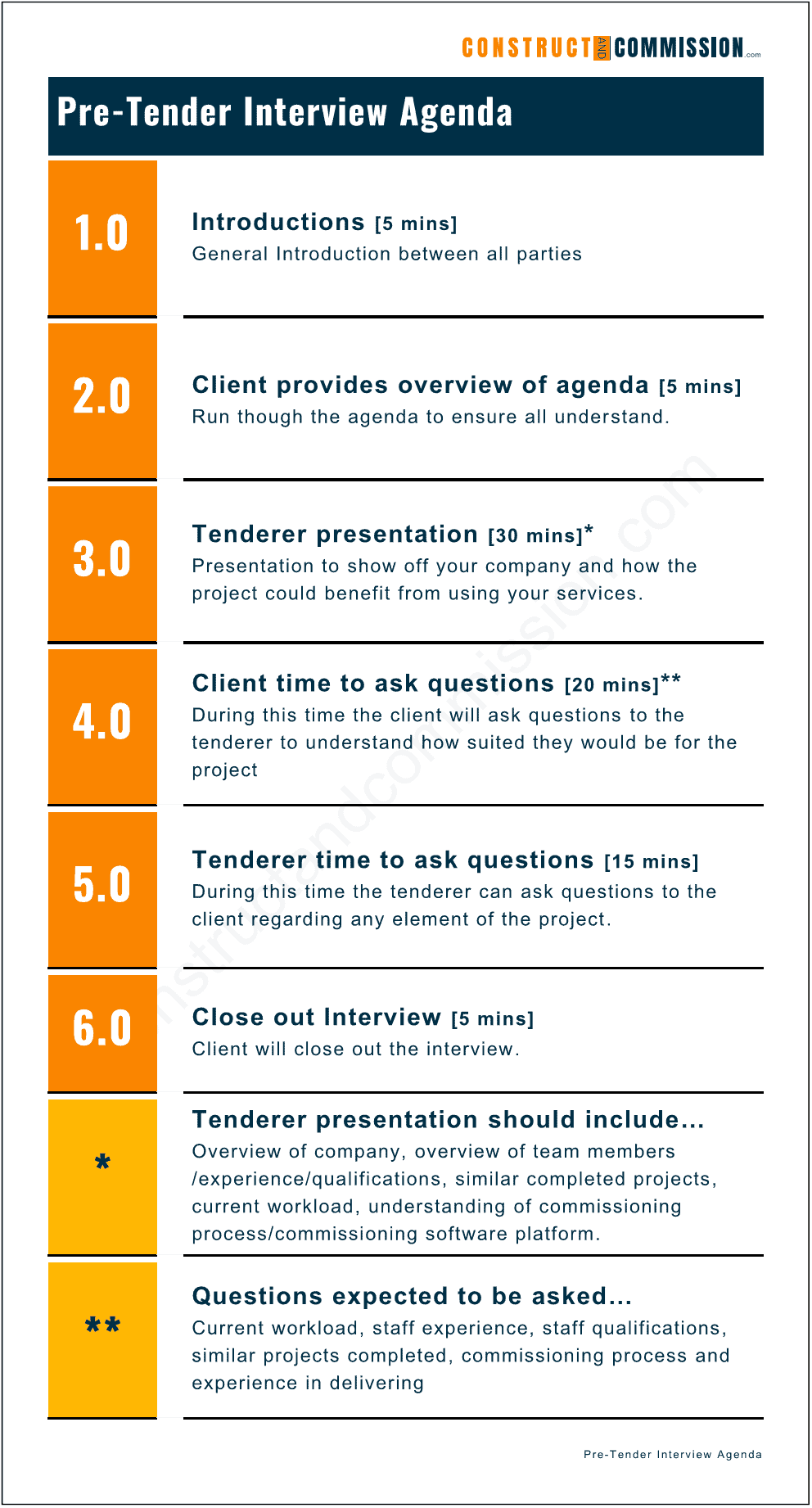
- Introductions [5 mins]
- The client provides an overview of the agenda [5 mins]
- Tender presentation [30 mins]
- Client time to ask questions [20 mins]
- Tenderer time to ask questions [15 mins]
- Closeout the interview [5 mins]
Other Information to issue
To help the tenderer prepare, as well as issue the agenda the client, should also include the following information:
- Information on the interview, if being conducted at a location or remotely
- A brief overview of the project
- A brief overview of the deliverables expected from the tenderer
- A rough timeline of the project
[Tenderer] Preparation
As noted above, the client will confirm the dates of the pre-tender interviews a couple of weeks before the tenderer is to attend. This time is provided to allow the tenderer to be ready and prepared.
NOTE: Preparation should not be underestimated as this interview is held for the client to understand if there is any reason the tenderer should not be included in the future tendering process, and sometimes any future tendering.
The preparation is pretty simple and can be covered in a few steps:
- Review and understand the agenda.
- Review and understand the overview of the project.
- Review and understand the overview of the deliverables expected from the tenderer.
- Review and understand the rough timeline of the project.
- Ensure the anyone involved in the interview is aware of all the above.
- Create a presentation including items as noted in the agenda [as minimum] – try not to make it long-winded and pages and pages of words.
- Prepare a list of questions that you would like to ask
- Ensure, if the client has requested a remote interview, you are able to use the software, log in and share documents/presentations, etc.
[Client] Preparation
It’s not just the tenderer that needs to complete preparations, there is a little work for the client as well…
- Ensure rooms are booked.
- Information sent to the tenderer for address or if conducting the interview remotely, information on the software/site used/any log-in details.
- Organize team members to be in attendance.
If you want a PDF copy of the questions emailed to you, click the Download Button.
Pre Tender Interview Questions [from tenderer]
At this stage don’t really want to overdo it with questions, but need to ask something or we end up with that ‘silence’, when asked.
We have listed some questions below, that could be used as a guide:
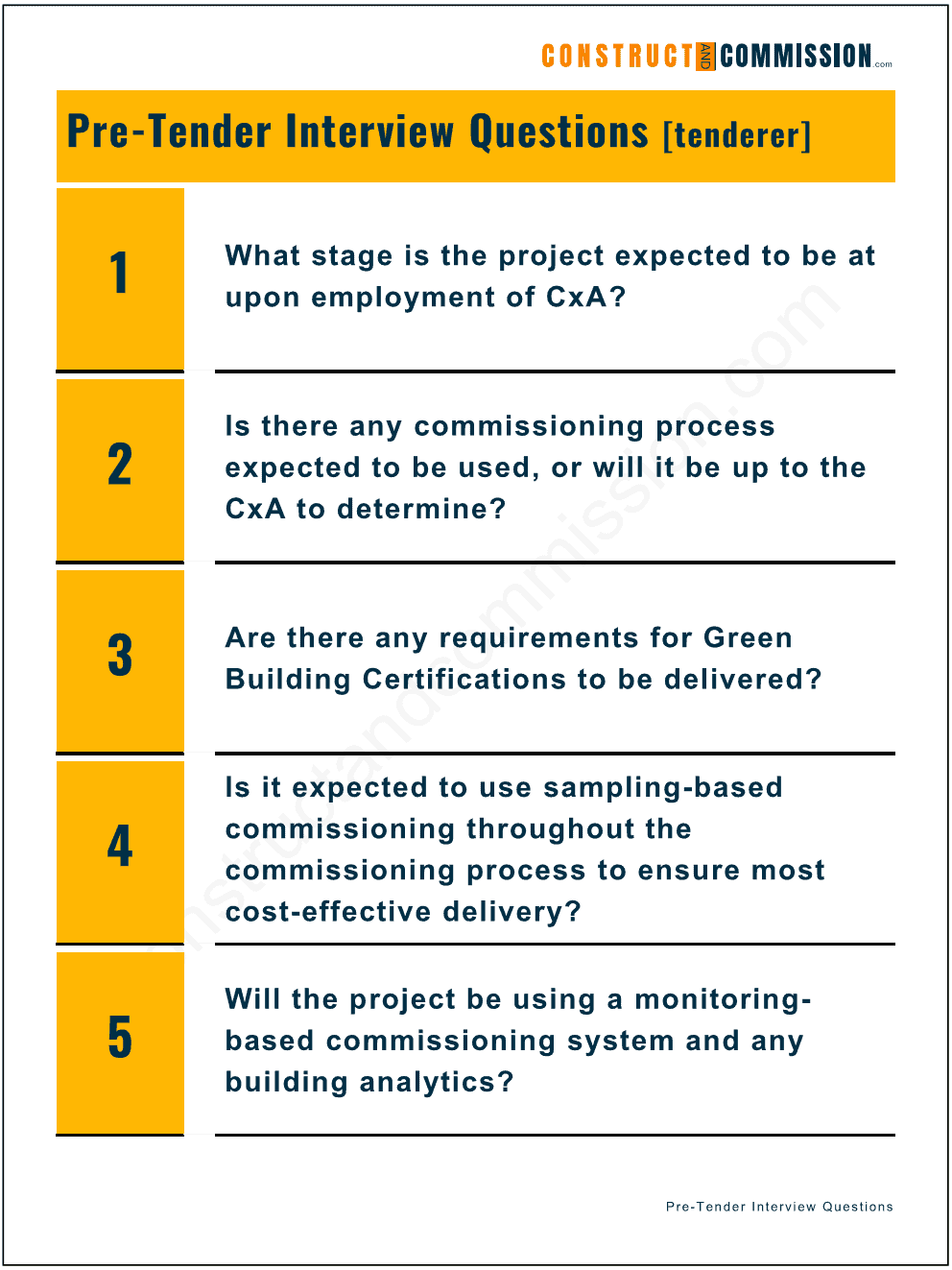
- What stage is the project expected to be at upon employment of CxA?
- Is there any commissioning process expected to be used, or will it be up to the CxA to determine?
- Are there any requirements for green building certifications to be delivered
- Is it expected to use a sampling-based commissioning process to ensure the most cost-effective delivery?
- Will the project be rising a monitoring-based commissioning system and any building analytics?
Pre Tender Interview Questions [from client]
As noted in the Agenda section. The client should usually ask some questions:
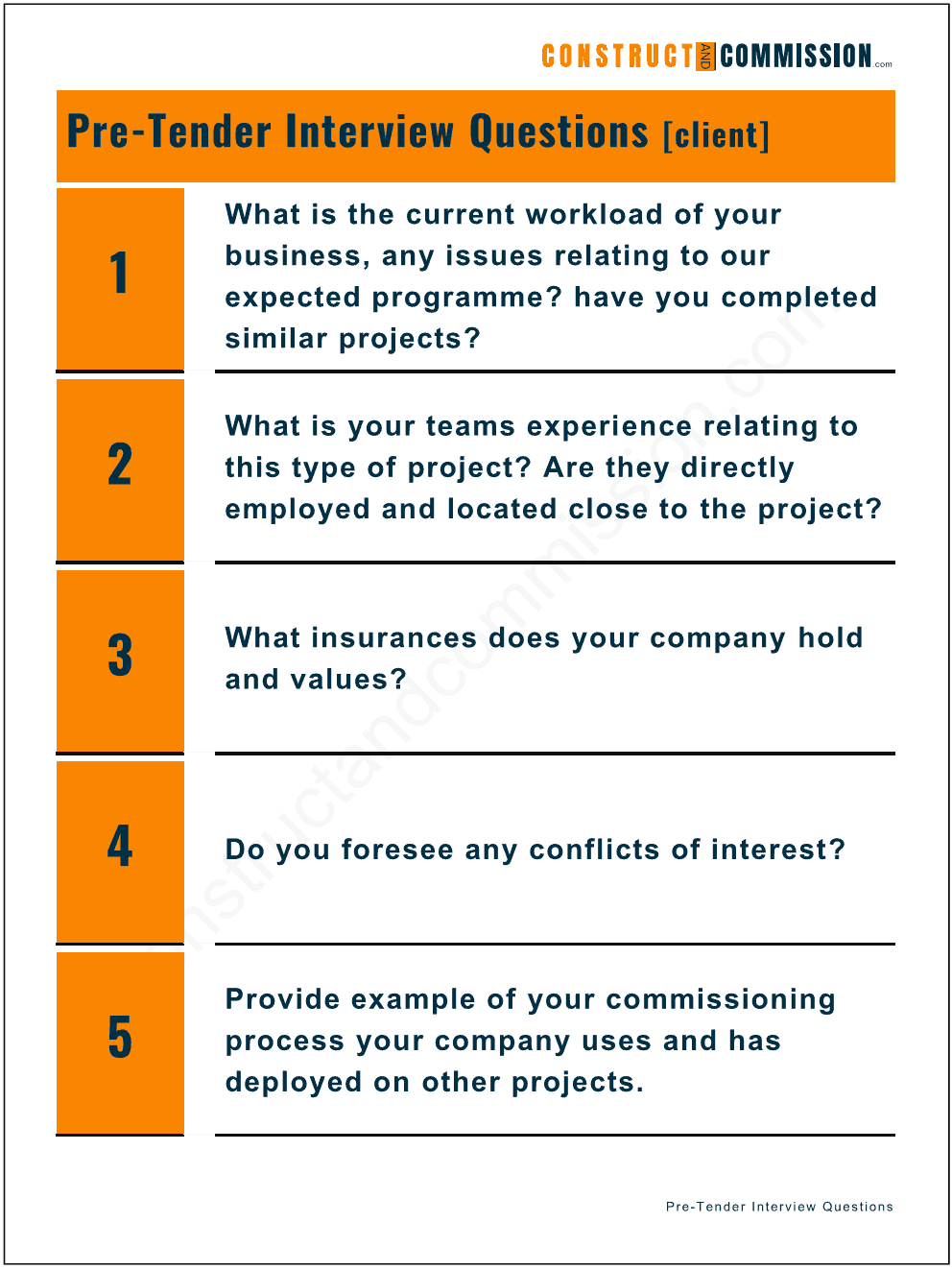
- What is the current workload of your business, any issues relating to our expected programme?, and have you completed similar projects?
- What is your team’s experience relating to this type of project?, are they directly employed and located close to the project?.
- What insurances does your company hold and values?
- Do you foresee any conflicts of interest?
- Provide an example of your commissioning process your company uses and has deployed on other projects?
Mid Tender Interview
What is a Mid-Tender Interview
Mid-tender interviews are common when the project is quite large or complex. They are held after the pre-tender interviews once all tenderers have fully digested the information sent to them within the tender documentation.
The reason for including them in the tender process is basically to ensure everyone is on the same page, and to allow the client an opportunity to understand that, after evaluating the tender information sent, the tenderers fully understand the expectations and deliverables required. This will provide the client confidence the proposals that they will receive will be in compliance with requirements and there will not be any major errors that will preclude some of the tenderers, ultimately creating a risk to the project and procurement process.
Mid Tender Interview Agenda
Similar to the pre-tender interviews, an agenda should be issued when the client issues the invitation for the tenderer to attend the interview.
This will ensure that everyone involved is prepared and ready.
Here is an example agenda that could be used:
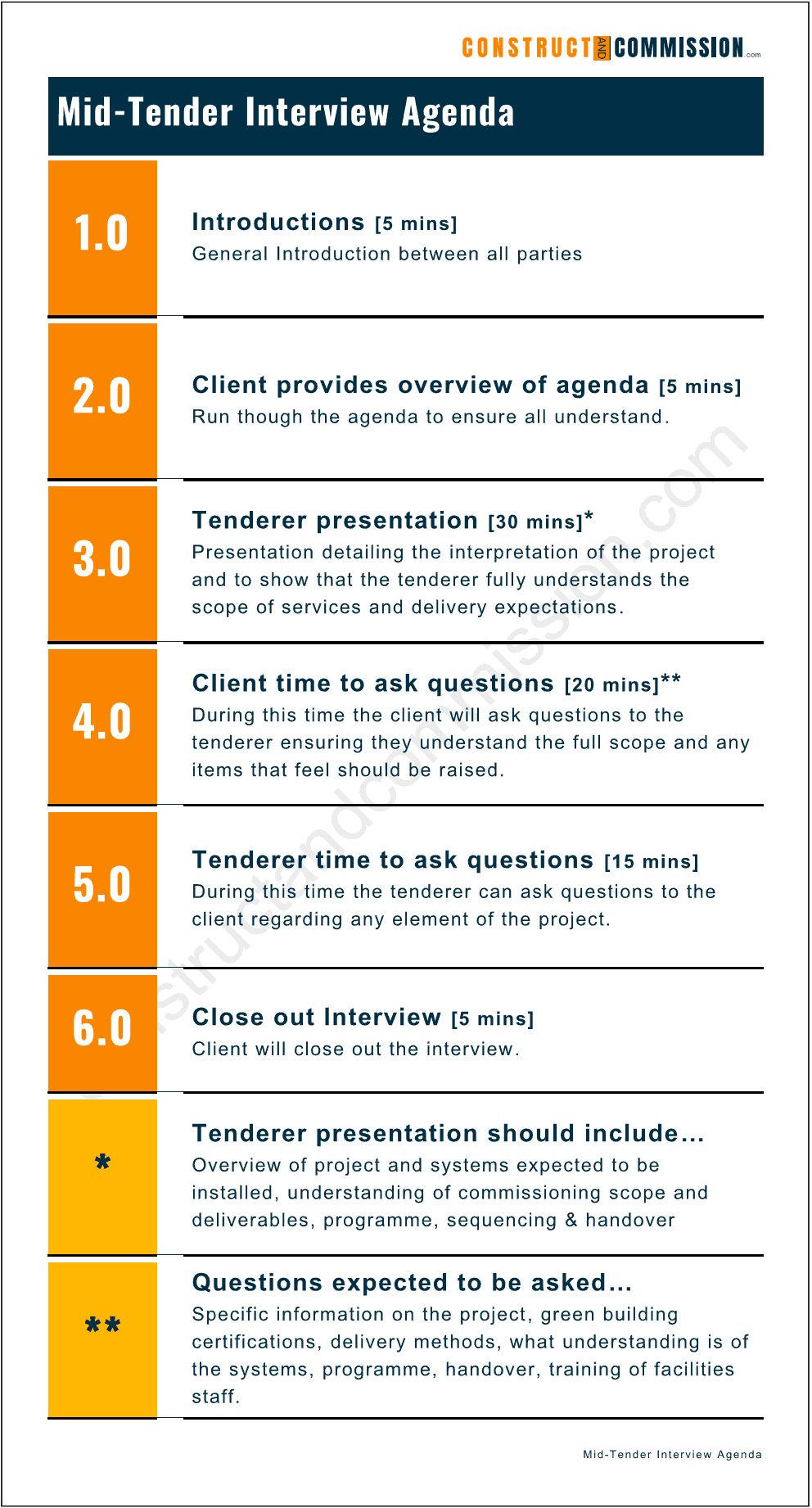
- Introductions [5 mins]
- The client provides an overview of the agenda [5 mins]
- Tender presentation [30 mins]
- Client time to ask questions [20 mins]
- Tenderer time to ask questions [15 mins]
- Closeout the interview [5 mins]
[Tenderer] Preparation
The preparation for the mid-tender interviews will be much the same as the Pre-Tender Interview:
- Review and understand the agenda.
- Review and understand the overview of the project.
- Review and understand the overview of the deliverables expected from the tenderer.
- Review and understand the rough timeline of the project.
- Ensure the anyone involved in the interview is aware of all the above.
- Create a presentation including items as noted in the agenda [as minimum] – try not to make it long-winded and pages and pages of words.
- Prepare a list of questions that you would like to ask
- Ensure that if the client has requested a remote interview, you can use the software, log in and share documents/presentations, etc.
[Client] Preparation
It’s not just the tenderer that needs to complete preparations; there is a little work for the client as well…
- Ensure rooms are booked.
- Information sent to the tenderer for address or if conducting the interview remotely, information on the software/site used/any log-in details.
- Organize team members to be in attendance.
Mid Tender Interview Questions [from tenderer]
The questions could be changed to clarifications as well, if required:
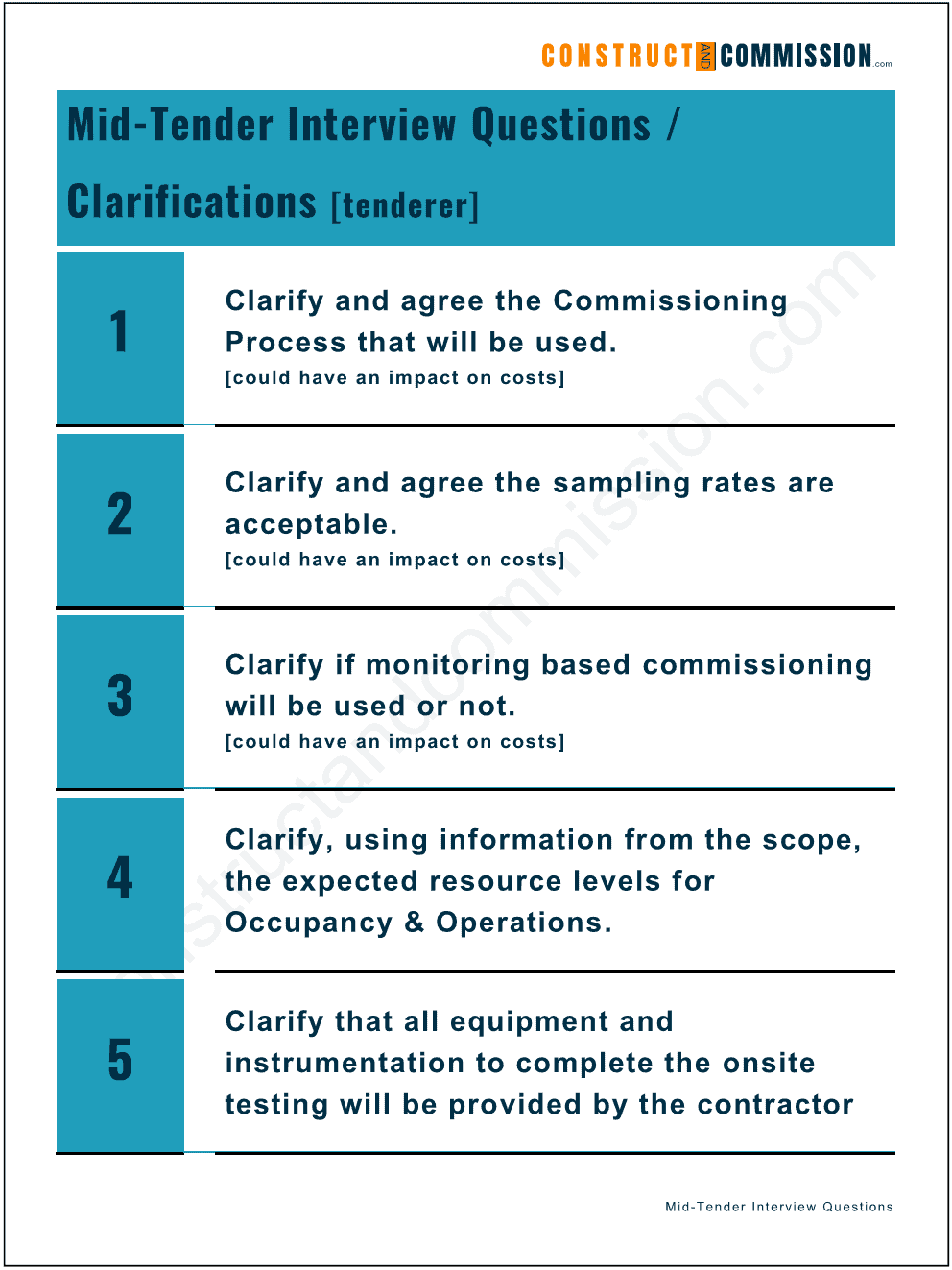
- Clarify and agree on the commissioning process that will be used.
- Clarify and agree on the sampling rates that are acceptable.
- Clarify if monitoring-based commissioning will be used or not.
- Clarify, using information from the scope, the expected resource levels for Occupany & Operations.
- Clarify that all equipment and instrumentation to complete the onsite testing will be provided by the contractor.
Mid Tender Interview Questions [from client]
As noted in the Agenda section. The client should usually ask some questions:
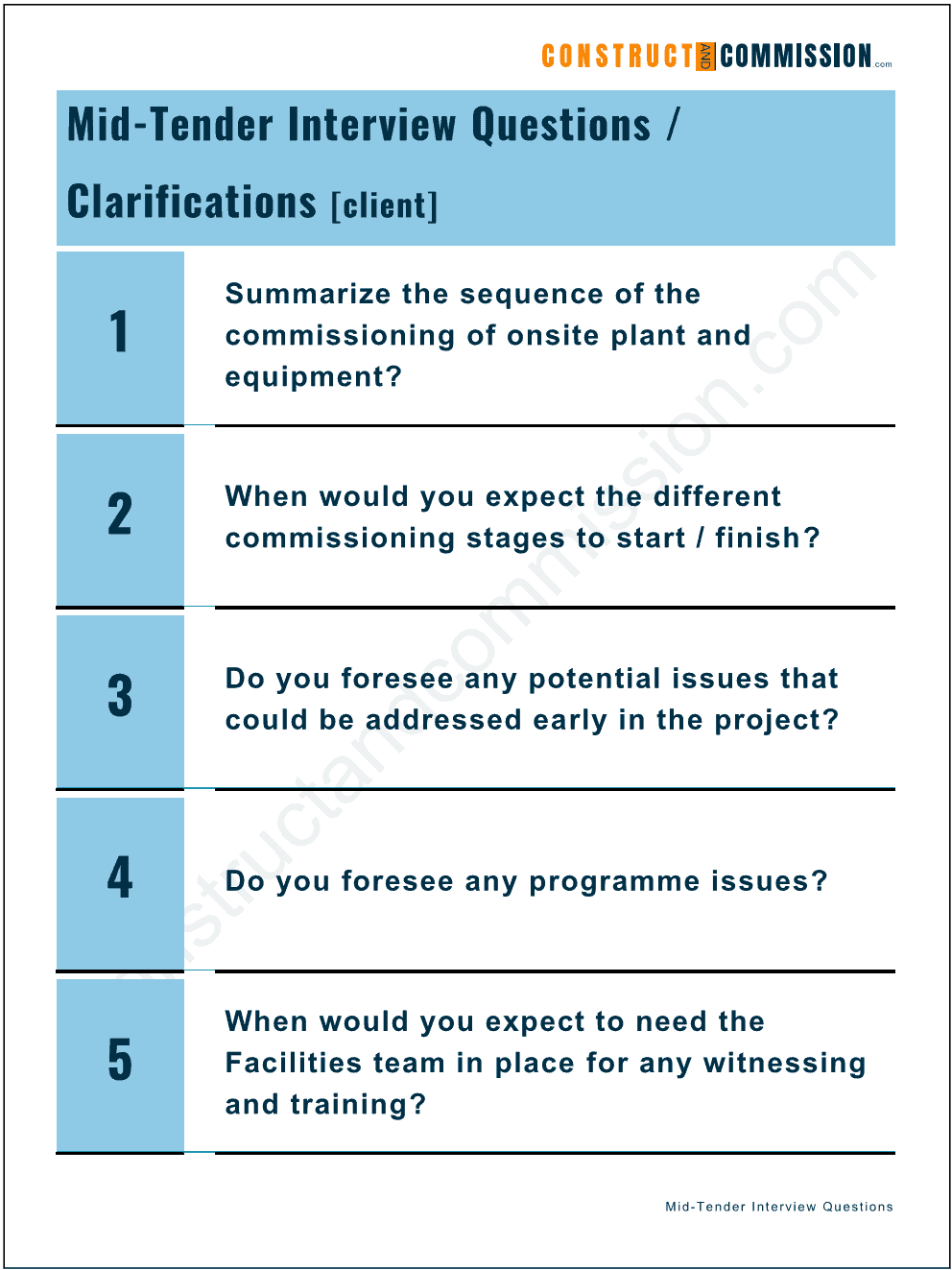
- Summarize the sequence of the commissioning of onsite plant and equipment?
- When would you expect the different commissioning stages to start/finish?
- Do you foresee any potential issues that could be addressed early in the project?
- Do you foresee any programme issues?
- When would you expect to need the Facilities team in place for any witnessing and training?
Post Tender Interview
Description
The post-tender interview is conducted after all proposals have been submitted from the tenderers and the client team has evaluated them, with all tender queries/clarifications being answered.
The purpose of these interviews at this stage of the project is:
- For the tenderer to present their final proposal, showing the client that they are the most qualified and best fit for the project.
- For the client to ask and understand anything that may have been picked up in the tender reviews or throughout the process that had not been previously clarified or asked.
At this stage of the process, the client should already understand the following about the tenderers from the previous interviews:
- They have the capacity to complete the project [workload].
- Have the correct experience for the project [qualifications].
- Has the correct insurances for the project.
- Fully understands the expected deliverables
- Understands the programme and milestone dates
- Understands the handover expectations
Agenda
Very similar to the other agendas with a few little tweaks:
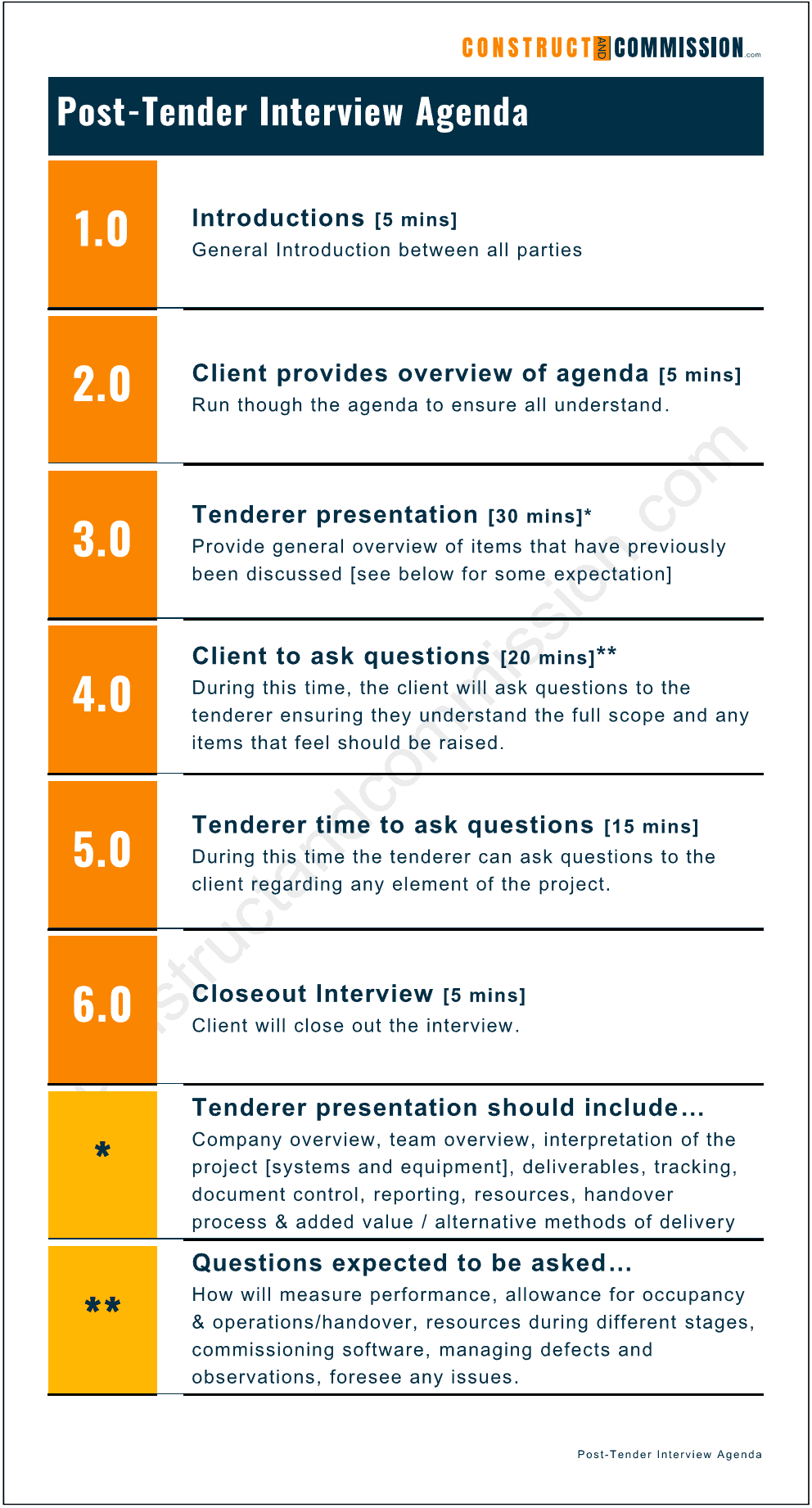
- Introductions [5 mins]
- Client provides an overview of the agenda [5 mins]
- Tenderer presentation [30 mins]
- Client to ask questions [20 mins]
- Client time to ask questions [20 mins]
- Tenderer time to ask questions [15 mins]
- Closeout Interview [5 mins]
[Tenderer] Preparation
The preparation for the post-tender interviews will be much the same as the Mid and Pre-Tender Interview:
- Review and understand the agenda.
- Review and understand the overview of the project.
- Review and understand the overview of the deliverables expected from the tenderer.
- Review and understand the rough timeline of the project.
- Ensure the anyone involved in the interview is aware of all the above.
- Create a presentation including items as noted in the agenda [as minimum] – try not to make it long-winded and pages and pages of words.
- Prepare a list of questions that you would like to ask
- Ensure that if the client has requested a remote interview, you can use the software, log in and share documents/presentations, etc.
[Client] Preparation
It’s not just the tenderer that needs to complete preparations; there is a little work for the client as well…
- Ensure rooms are booked.
- Information sent to the tenderer for address or if conducting the interview remotely, information on the software/site used/any log-in details.
- Organize team members to be in attendance.
Post Tender Interview Questions [from tenderer]
There should not really be any questions to be asked at this stage, as all questions should have already been discussed during the pre-tender, mid-tender, and the RFQ/RFI/TQ process.
Of course, add any that have popped up between the interviews.
Post Tender Interview Questions [from client]
As noted in the Agenda section. The client should usually ask some questions:
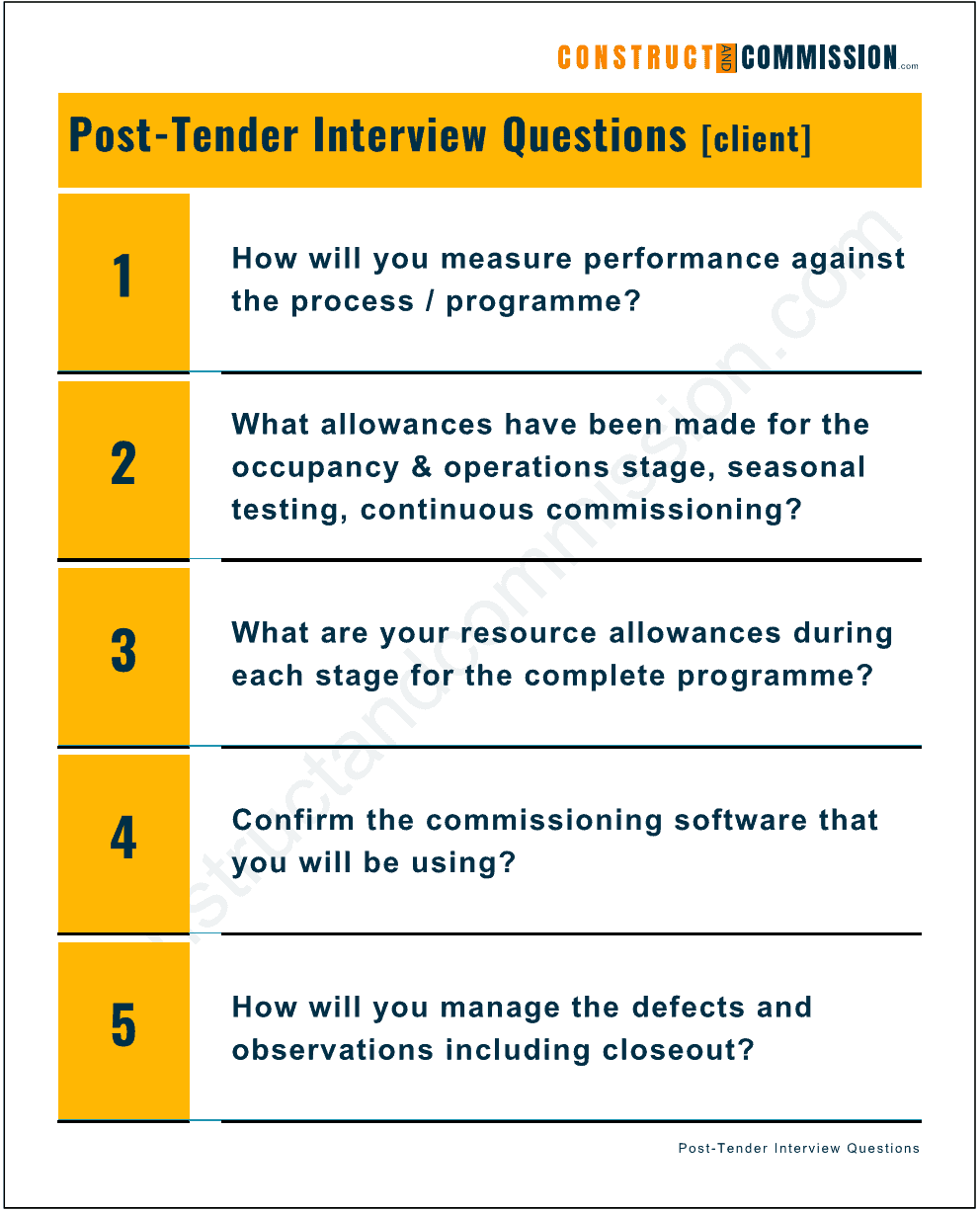
- How will you measure performance against the process/programme?
- What allowances have been made for the occupancy & operations stage, seasonal testing, continuous commissioning?
- What are your resource allowances during each stage for the complete programme?
- Confirm the commissioning software that you will be using?
- How will you manage the defects and observations including closeout?
Other Questions relating to Tender Interviews
Many questions could be asked outside of the above but will all depend upon the type of project:
- Do you accept the terms and conditions of the contract relating to payment terms
- Could you issue us, if asked, your best and final offer by …
Our Poll…
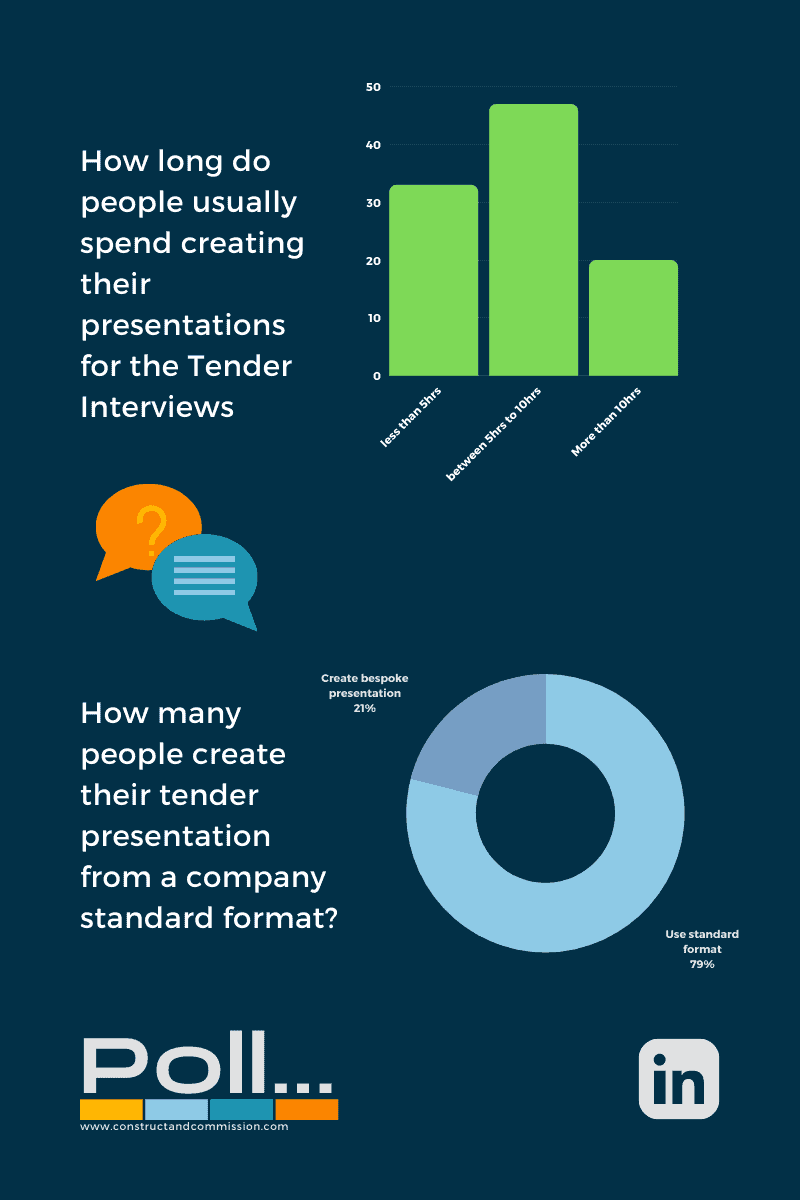
⬛ Related Articles
RFP / RFQ TENDERING PROCESS | How to Complete in 20 Steps
[RFP] CxA REQUEST FOR PROPOSAL | How to Write and Format with Downloads
[SOW] CxA SCOPE OF WORKS | How to write and format with downloads
ACKNOWLEDGMENT OF RFP/RFQ | with Simple Letter and Email Template
RFI vs RFQ vs RFP | Understanding the Differences


![Tender Interview Agenda [PDF]](https://constructandcommission.com/wp-content/uploads/2022/01/028a.webp)
![Tender Interview Questions [PDF]](https://constructandcommission.com/wp-content/uploads/2022/01/028b.webp)